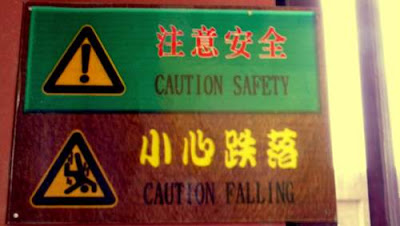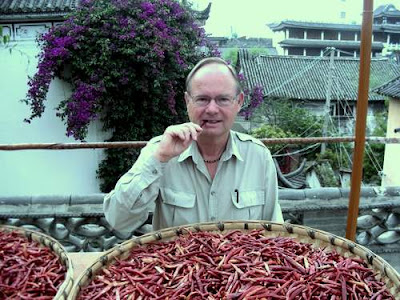 Dear Gentle Reader,
Dear Gentle Reader,That last post was meant to be shorter.
Arriving at Shenzhen airport (in Guangdong Province, just North of Hong Kong), on a recent trip, heading to Yunnan Province (far further North, but still only halfway up the country), we became worried about how long the authorities wanted us to stay, judging by the admonition to slip on the pillars around us...
Was this marketing for the local orthopaedic surgeons, or a bad translation?
Xiao xin (小心)(Careful/Be cautious), Chris... don't go there...
Much later, long after being disconcerted by the warnings, or the commands, in the airport, we would climb the belfry in Dali, Yunnan Province, to be frightened, again...
The belfry in Dali houses the Nanzhao Jianji bell, cast in 871 A.D.
First off, the belfry in Dali is not the big cultural deal in Dali, Yunnan Province.
Historically, and historically/culturally, the big deal would be the Three Pagodas of the Chongsheng Temple.
But, your humble scribe will show you those, the three pagodas, on some other day and some other posting.
And the Nanzhao Jianji bell is housed in the belfry which makes up part of the massive Three Pagodas of the Chongsheng Temple complex in Dali.
So, while the belfry is not a big deal, the Nanzhao Jianji bell in the belfry is a big deal.
The Nanzhao Jianji bell is a rather substantial Buddhist bell (its clarion call purifies the structure and the listeners, when struck, as its purity of tone allows the worshipers to purify their thoughts and therefore sanctify themselves).
The bell stands almost four metres tall, is more than two metres wide at its mouth, and weighs in at almost 16,300 kilograms (16.3 tonnes or 17.97 US short tons).
Now here is the frightful bit of information...
Despite those substantial dimensions, and its hernia-inducing mass, the Nanzhao Jianji Bell was lost.
And they don't even know when.
The loss occurred sometime between 1856-1872 A.D., it is reported.
Yikes.
The idea of losing 16,300 kilograms of bell is a bit terrifying from either a liturgical or an architectural inventory control perspective...
Anyway, the bell was recast in 1997. Here is a "close-up" of one of the six images (each as large as your humble scribe) cast into the bell...

What caught our attention, in the belfry, though, was the notice by the narrow stairs winding up and up (or down and down)...

Good cop, bad cop signage?
I don't know...
The final bit of translation that I liked, however was really just marketing via the mechanism of translation.
This time the object in question was a restaurant sign.
First, though, context...
Yunnan Province is located beside Szechuan Province and Yunnan's residents love their chilli peppers as much as Szechuan's residents love their chilli peppers...
(Aside. Note that while Spanish variants include chili and chile, the Aztecs used chilli and the English, as far back as the mid seventeenth century, were using chilli, also, as their spelling. So that is why I go with this spelling choice.)
Spelling be damned, dried chillis can be found in every market in Yunnan...

And on every street corner...

And in every balanced meal...

So, I particularly enjoyed this particular restaurant sign, aimed, after questioning the proprietors, at foreigners who said that they (the foreigners) wanted plain, as opposed to spicy, food...

Nice bit of translation there... ...after all, behind the sign, you can see the red lantern and the ubiquitous garland of drying chillis...
Tschuess,
Chris









6 comments:
Oh Chris, my favorite game!
What a lovely post. So much fun!!
The sign that is translated as Caution Safety should be rendered Pay Attention to Safety (Achtung! so to speak).
The phrase that they have rendered "Plain food" is plain food, but usually it is used in the context of "simple fare", "farm-style, peasant cooking" as opposed to the delicacies produced in the cities for the wealthy. So while they say that the food is not spicy, especially for foreigners, they are also taking a jibe at said foreigners for not appreciating the subtle (?) delicacies of their famous local cuisine and actually daring to ask for what literally means "rough tea and unsalted rice". And of course they are doing it with a four character idiom in very literate, high-brow Chinese. It is truly a sign worthy of the "Haikuist" (who we hope will be up to his inscribing his magical markings in the wet clay again soon).
Teresa,
I was hoping, and knowing, that I would get a superb comment, from you in particular, on the "plain food" sign. And you described the detail so much better than I would have. Or, frankly, could have.
You, I think, could be a lot of fun on a jaunt through China.
As long as your moral outrage could be held in check, that is. :)
Should you come, and should we still be here, a trip to China would surely be in order for us all.
(Your entourage can include all who will fit in the nooks and crannies of our house [sic...apartment]. This, history has shown us, can be a few, although comfort starts to decrease as the bodies pile up. Not that Mao paid much attention to that aphorism...)
Tschuess,
Chris
Chris,
I'm a Chinese daughter-in-law. I can be pragmatic with the best of them. I am NOT anxious to play hide-and-seek in a Chinese jail!
Bell-schmell. Whatever happened to voluptous USA tourists that you mis-directed?
Rick
What a fun journey. Love your info about Buddhist bells: of course!
"Pommes is back!?"
Quiet Miss Kitty!
Aloha-
Comfort Spiral
Chris: The "lost" bell is a riot, and you're certainly having fun with your translations: they remind me of the "blog" of "unnecessary" quotations marks I ran across a couple of years ago:
http://www.unnecessaryquotes.com/
I can only go on feel and intuition, but I fear that more than a few classics translated into English are mangled into "Plain Food." When I get that feeling, there's no amount of "you must read" that can keep me going...
Post a Comment